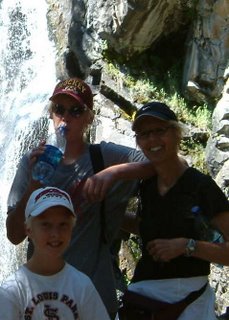
To sort of quote the Beastie Boys, “you’ve got to fight (Williams) for your right to party” by choosing a personally important topic. Williams, chapter after chapter, seems to miss what makes writing good – heart, soul, and a personal connection from writer to subject to reader. I have my undies in a bundle about two things Williams says. The first is his statement that “few people, especially children, know themselves well” enough to write autobiography. That’s just bunk. At any given period of time we are often our own best writing material, and children are no exception. I love autobiographical writing coming from any age – and sometimes what people don’t know about themselves that is revealed in autobiographical writing is just as interesting as what they know. Instead, old farty Williams wants high school kids to write about topics they know a ton about like the health hazards of AIDS, locker searches, and high school preparation for the workforce. He lost me at the AIDS assignment. My second issue with my boy James is (of course) the group writing. How dumb is it to assign a group project to high school kids with the direction, “each group member will work on one part of the report, and then the whole group will put the parts together to make a complete paper.” I choose to work on the title. I honestly wonder if Williams has spent any time outside of a high ability high school class. Spandel has got it right with having students find their own topic. What’s fun about papers that come from a student’s interest is that the teacher can get to know the student better and forge a stronger connection with the student, which can in turn help the student produce better writing. Everyone wins. Spandel says that “defining a topic is central to the thinking part of writing” and though it may be harder for the student to get started, the product in the end is bound to be so much better.
Students are multigenre kids living in a multigenre world. They see people use different genres to unite a theme all the time. For example, comedian Sarah Silverman mixes comedy, music, and animation in the writing of her show. Students use their Myspace page to showoff their poetry and rap lyrics while using photographs to tell people who they are. As they take notes in class they draw, doodle, and write notes that may or may not be on topic. The world is muligenre, why not writing? I appreciate the step by step “how to” that makes incorporating multigenre papers into the classroom possible. I got a good chuckle when I read the more analytic science and math heads have a harder time with the multigenre paper. Oh well, they have lots of opportunities to write formulaic essays on the standardized tests and college applications. The quest for higher test scores just might be the multigenre paper’s demise. With larger class sizes and less instructional time, teachers may find it necessary to teach a more formulaic process and not have the time to give the students the pleasure of working on a multigenre paper. For me, I’m game to give a multigenre paper a try and may just work on my own along with my students.
Students are multigenre kids living in a multigenre world. They see people use different genres to unite a theme all the time. For example, comedian Sarah Silverman mixes comedy, music, and animation in the writing of her show. Students use their Myspace page to showoff their poetry and rap lyrics while using photographs to tell people who they are. As they take notes in class they draw, doodle, and write notes that may or may not be on topic. The world is muligenre, why not writing? I appreciate the step by step “how to” that makes incorporating multigenre papers into the classroom possible. I got a good chuckle when I read the more analytic science and math heads have a harder time with the multigenre paper. Oh well, they have lots of opportunities to write formulaic essays on the standardized tests and college applications. The quest for higher test scores just might be the multigenre paper’s demise. With larger class sizes and less instructional time, teachers may find it necessary to teach a more formulaic process and not have the time to give the students the pleasure of working on a multigenre paper. For me, I’m game to give a multigenre paper a try and may just work on my own along with my students.
My web link is an NCTE journal that is all about multigenre teaching. The link is http://www.ncte.org/pubs/journals/ej/contents/106450.htm. There are articles from using a multigenre approach to teaching the classics to helping students understand multigenre texts. Good stuff! You must belong to NCTE to have access to this material.
